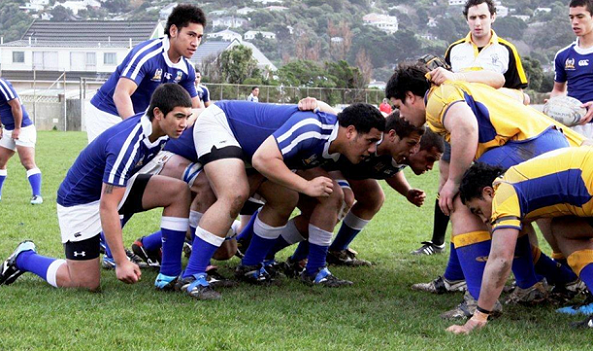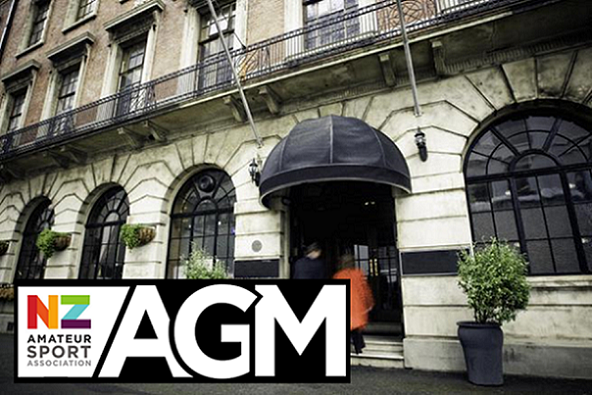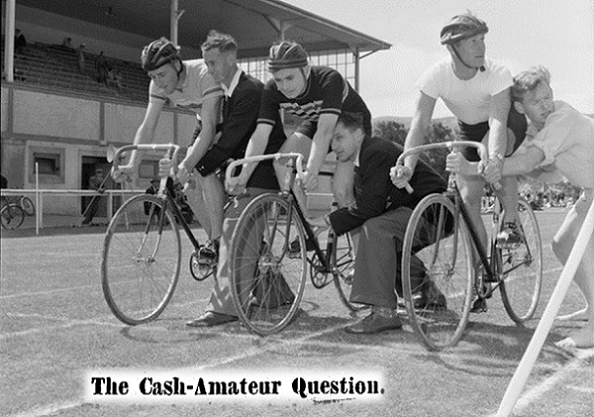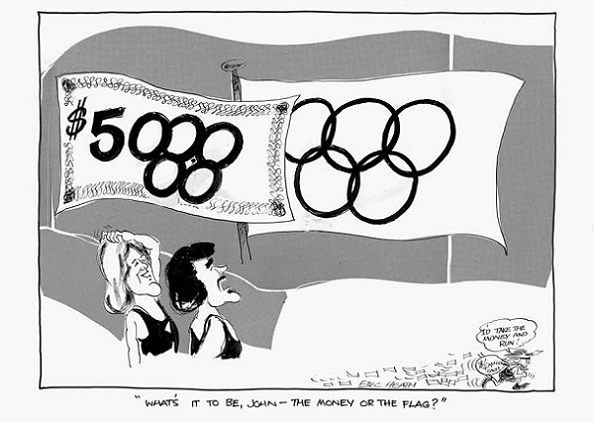Issue 53 : 19 April 2020
Talofa Lava, Kia Orana, Malo E Leilei, Tena Koutou, Hello ...
... and welcome to the latest issue of “For The Love Of The Game”, the official e-zine of the New Zealand Amateur Sport Association Inc. We hope you enjoy reading the articles below.
If you have any feedback on this issue, ideas for future articles, or would like to contact the Editor, please click here. And, you are invited to forward the e-zine to others you know, who may be interested in reading it.
As New Zealand continues to negotiate the significant social challenges arising from the current COVID-19 crisis, the need for clarity of thought and action in respect of future guidelines for participation in community sport, for the health and well-being of all New Zealanders, is becoming increasingly acute. As you will read below, the Association is continuing to advocate with all relevant authorities on behalf of all amateur sportspeople.
If you are interested in applying for membership of the Association, please click here.
Association Calls For COVID-19 Community Sport Guidelines ...
When will we be able to say, “it’s O.K. to play”?
Defining what a “safe” environment is for community sport will be top-of-mind for parents, spouses and partners of sportspeople, and for sportspeople themselves, once the community sport ban is lifted. Last week's Media Release by the Association called for all community sport stakeholders, from the "grass-roots" up, to be involved in answering this question.

While sportspeople and sporting communities across the country eagerly await the lifting of restrictions on community sporting activities, both on-field and off-field, there is a challenge for all sporting codes to describe what will constitute a “safe” environment for playing sport and socialising around sport in the future. For many, their perception of "safety" will be influenced by intangible factors, which will likely determine their willingness to "play the game" once more.
To move community sport “from crisis to confidence”, an open and honest discussion by all community sport stakeholders with government and health-authorities will be required, with the Association willing to support this process through its comprehensive network and database of New Zealand community sport clubs. The Association has offered to support the Minister and Sport New Zealand in facilitating a discussion across all community sport organisations.

You can read the Association's full Media Release, by clicking here.
Sports Clubs Can Now Apply For Emergency Relief Funding, (In Wales) ...
In Wales, voluntary (i.e. non-professional) sports clubs can now apply for a maximum of £5,000 emergency relief funding to help stay afloat as COVID-19 forces people to stay indoors and away from clubs. Funding has been made available by the Welsh Government and Sport Wales.

Funding is available if: a. the main purposes of the club are to provide facilities for and to promote participation in amateur sport; b. membership of the club is open to anyone interested in the sport; c. any surplus income or profits are reinvested in the club; and d. if the club ceases, any remaining assets are given or transferred to another registered sports club, a registered charity or the sport’s governing body for use by them in related community sports.
The above criteria are equivalent to the rules which apply to sports clubs in New Zealand if incorporated under the Incorporated Societies Act 1908. As promoted with the Minister, the Association has earlier encouraged a similar universal grant, for similar purposes. Last week, the Minister’s office advised the Association that Sport New Zealand is responsible for determining what (if any) financial support will available to clubs. The Association has again offered its assistance to the Minister’s office and Sport New Zealand in developing this policy.

You can read more about the Welsh financial package, by clicking here.
Secondary School Rugby A Key Focus For Our National Game ...
New Zealand Rugby’s new focus on rugby outside of the “elite game” at secondary schools will be welcomed by many as a key step toward rejeuvenating the game for teenagers. A goal of the new strategy is to diminish the shadow cast by "high-performance" over "wider-participation", across all groups of students whether they be male, female, Maori or of Pacific island heritage.

Speaking with the Association’s Chairman on “The Footy Show” (a weekly radio programme supported by the Association), New Zealand Rugby’s Secondary School Manager, Callum McNair said, “getting people back in love with game and providing opportunities” is central to New Zealand Rugby’s strategy, with the goal of providing “the game that they want to play, in an environment they wish to play in, in formats that suits their needs”.

You can listen to the full interview, by clicking here.
Viewpoint : Time To Separate Professional And Amateur Sport Governance ...
Is it wise to co-mingle the finances and operations of not-for-profit sport organisations with for-profit affiliates? Formal separation of entities may ensure the commercial-failure of one, will not result in the community-failure of the other.

A 2011 decision by the New Jersey Supreme Court in the United States regarding property tax exemptions for non-profit organisations, highlighted the risks of co-mingling non-profit finances and operations with for-profit affiliates. In its ruling, the Court warned that doing so could jeopardise the tax status of the non-profit entity.
Given the current financial challenges for community sport in New Zealand, the risks of “co-mingling finance and operations” are worth considering. Some sport organisations reporting as “public benefit entities” may aggregate all forms of income and expense (both community and commercially-related). It is therefore possible that a failure of an entity’s commercial activities could have both unintended operational and financial impacts on its ability to deliver sport to the community. (This could equally arise from a failure of the community-funding model which relies on central government, local authorities, donations, grants and membership subscriptions).

In the current environment, where both the commercial business of sport in New Zealand and traditional community-funding is under considerable financial stress, a clear separation of entities which are on the one-hand supporting amateur sport for community benefit, from entities which are on the other hand generating revenues for commercial purposes, could be a sensible option. Clear separation of finance and operations for the specific purposes of each, may in fact serve to better protect both.
E-Sports “Boom” As Mainstream Sports “Bust” ...
While e-sports have unsurprisingly increased in popularity following the global COVID-19 quarantine, it’s not all plain-sailing for e-sport companies. Generally, e-sport companies (i.e. those that promote e-sport events) are subject to the same capital demands that traditional sports face, with “player costs” (according to one report) taking up to half of an e-sport company’s operating budget on average, resulting in the majority of companies being cash-flow negative. In the current environment of global financial uncertainty, new venture capital to support the burgeoning e-sports industry may be harder to come by.

However, according to “Verizon” (an American telecommunications company), United States on-line video-game usage during peak hours has gone up by 75 percent since the COVID-19 quarantine first went into effect last month. Some analysts are picking that companies in the video-game sector will weather the pandemic-storm relatively well, compared to other sectors.

Unlike mainstream sport, which comparatively has better physical and mental benefits, e-sport does not provide the social-interaction which typically acts as a building-block for healthy communities. Sports clubs across New Zealand will need to strongly re-assert these benefits, once the current quarantine-period ends.
Annual General Meeting Postponed Until Tuesday, 26 May ...
Owing to the general prohibition on public-gatherings at COVID-19 Status Level 3, the Association’s fourth Annual General Meeting will be postponed until Tuesday, 26 May. In the meantime, the Association’s Honorary Auditor, Les Foy, is conducting his audit of the Financial Statements. The Registrar of Incorporated Societies has been advised of the postponement.

The Annual Report will be e-Mailed to Members in advance of the Annual General Meeting.
From The Archives ...
LYTTELTON TIMES, VOLUME LXXVIII, ISSUE 9861, 20 OCTOBER 1892
"TO THE EDITOR
Sir, —If you can spare me the space I would like to point out … there can be no such thing as “cash-amateurism”. I maintain that a true amateur is a gentleman who adopts a certain sport as his hobby; who pursues that sport purely for love; who endeavours to win the events for which he enters solely for the honour of defeating his fellow-competitors, not caring what the trophy may be, merely accepting it aa a certificate of his prowess. I am well aware what all this entails, but I say emphatically that unless the would-be amateur can afford to do all this without hoping for return, then his amateurism is a sarcasm and insult to those who can.
I am, &c.,
A PROFESSIONAL AMATEUR"

In the 1890’s, the term “cash-amateur” was coined to describe a move by the sport of cycling to pay cash prizes to winners of amateur events, to assist them to defray their costs of participation. This led to a split in cycling between “true amateurs” and “cash-amateurs”. The split was roundly condemned, as was commented at the time, “a cash-amateur is as utter an absurdity as would be a polar expedition to the equator, a square wheel, or a yacht race on the Randwick racecourse. To maintain that a cyclist who receives cash prizes may be called an amateur, is simply to set at defiance the definition of the term accepted by every cycling community throughout the world.”

Other sporting codes including cricket and rowing resisted the trend to allow “cash-amateurs”, forbidding those who competed for cash to participate in their sports. However, the designation was embraced by athletics. Globally, the definition was at odds with the Olympic charter and sportspeople were forced to either define themselves as “amateur” or “professional”. By the 1950’s the designation had become acceptable in New Zealand motor-sport. Today, the term has become redundant, with most sporting codes have a clear distinction between “amateurs” and “professionals”, in financial terms.
The Final Word ...
“Sport plays a powerful role in helping people lead healthy, productive lives and contributes to the health and wellness of our communities.”
(Lisa Beare, British Columbia Legislative Assembly)